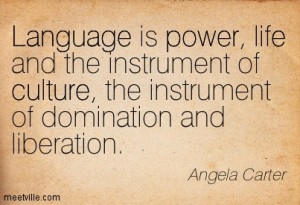Words.
Words are not only cultural, they are personal. Even within one particular culture, a word can have many various personal interpretations of a word. Those personal understandings of words signifies that the “world of words” that we live in. Chamberlin discusses the “ability of language itself–to discriminate between what is true and what is false, what is fact and what is fiction, what is important and what is unimportant” (163). Since language can help show truth and lies, it is the responsibility of the speaker to use words that factually represent this.
The meaning behind the world of words that Chamberlin describes, is that our world is inundated with words that can two effects-to help or harm. Words shape narratives about cultures, about people, and about experiences. These narratives in Canadian literature often aid those who represent power in the country and harm those who were and are effectively denied power in Canada. These narratives can take the form in stories about the “wild” or “savage” Aboriginal peoples that Europeans “explorers” encountered. We know now that these words are descriptions created to shift power and not accurate or true. Words carry weight and in the country we live in, that weight is shifted unfairly to demonstrate power. That is the current world of words in Canada.
An example in story-telling of how language can represent what is fact and what is fiction mentioned by Chamberlin is demonstrated in the video by Brave New Voices with a slam poem “Rape Joke” (trigger warning). The girls in the video talk about how poetry often describes things in metaphors such as “violets” for the dark skin under eyes. They then go on to say that regardless of what metaphors someone attaches to something, the truth of what it is behind the description will remain the same. Chamberlin, regarding metaphors states “After a while, any metaphor begins to lose its strangeness and to become so familiar that it seems simply true,” (162). When a metaphor that may be false becomes familiar and appears to then be true, this is when those narratives shaped by the metaphors and words that are not fact become a problem.
We feel closer to the world we live in because of the words we use and others use can “bring back very personal memories” (181). Chamberlin is talking about a poem reminding him of personal loss, but words can bring back any type of memory. From my own experiences, the word ‘cute’ stands out in my mind as bringing forward thoughts of personal loss. I struggled with feeling beautiful throughout school and often resorted to damaging eating patterns. I was always called cute (I am just over 5 feet tall and fairly young-looking) and when I was growing up, this word was not a word that I wanted to hear. Still when I hear it, it brings back whole sorts of memories regarding my battles with self-acceptance and the labels from others. This mantra is one that helped me shape what words I wanted to define myself through. That is just one example of how words are personal and have attachments to them.
The world we live in is full of riddles, metaphors, and charms. These shape the stories that in turn shape us.
 (https://meetville.com/images/quotes/Quotation-Angela-Carter-culture-life-power-language-Meetville-Quotes-119649.jpg)
(https://meetville.com/images/quotes/Quotation-Angela-Carter-culture-life-power-language-Meetville-Quotes-119649.jpg)
Thank you for reading! 🙂
Hey Alyssa,
I thought you did a great job of explaining the world of words that Chamberlin describes. It definitely helped me better understand the effects that words have in shaping our narratives.
You talked about how words can negatively shape narratives about people and cultures such as the descriptors of “wild” and “savage” to describe the Aboriginals in Canada. It seems evident that words are still used inaccurately to harm those who have historically been marginalized. For example, The word “Thug” was used by white news reporters to describe the African American rioters and looters during the Baltimore riots. This word is particularly upsetting to young African Americans who are constantly reminded of how thug-ish they are, despite their achievements. The word “thug” to African Americans brings back personal memories of being called the n-word. Both words are by those in power to reinforce exclusion and discrimination. It is evident that the term “thug” is a word that belongs to and is controlled by the white population, as emphasized in a CNN article: “It’s amazing. You don’t call six police officers who kill a man without probable cause ‘thugs,’ but children who are frustrated and don’t have an outlet, you call them ‘thugs.” (http://www.cnn.com/2015/04/29/us/baltimore-riots-thug-n-word/)
Hi, thank you for reading!
That article you linked to is great, I really enjoyed how in depth they were. It would be interesting to see some research done on this. I think words can carry such an impact and have really negative consequences for those at the receiving ends of negative ones. People can also take back words though which I find fascinating, such as how the LGBTQ community has “taken back” the word queer http://www.colorado.edu/ling/CRIL/Volume17_Issue1/paper_BRONTSEMA.pdf.
Have a great week 🙂
🙂